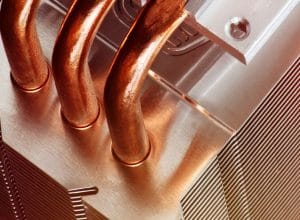 The field of manufacturing was one of the bigger areas where heat exchangers first made an impact. Traditionally, manufacturing companies had to keep their electrical control panels and other enclosures cooled using air conditioning or air compressing solutions. When heat exchangers provided a more efficient and cost-effective way of cooling electrical equipment, the burdens that come with air conditioners and air compressors were no longer an absolute necessity. Since then, heat exchangers have continued to help streamline the manufacturing industry by making technology more efficient. Those benefits have also extended far beyond manufacturing as nearly every other industry have followed suit.
The field of manufacturing was one of the bigger areas where heat exchangers first made an impact. Traditionally, manufacturing companies had to keep their electrical control panels and other enclosures cooled using air conditioning or air compressing solutions. When heat exchangers provided a more efficient and cost-effective way of cooling electrical equipment, the burdens that come with air conditioners and air compressors were no longer an absolute necessity. Since then, heat exchangers have continued to help streamline the manufacturing industry by making technology more efficient. Those benefits have also extended far beyond manufacturing as nearly every other industry have followed suit.
The fundamental advantages of heat exchangers
Heat exchangers are an innovative thermal management solution that approach electrical cooling differently than their predecessors. The fundamental change is in the way they handle electrical waste heat; instead of combatting it with chilled air, heat exchangers transfer heat before it has a chance to accumulate. The fluid inside of the cooling unit is able to absorb waste heat without allowing for any rise in temperature, and then transfer it continuously to prevent it from forming heat pockets. This effectively prevents electrical overheating and doesn’t require the same amount of energy or level of maintenance as traditional air conditioners or air compressors.
Streamlined cooling for more advanced applications
As manufacturing companies began to benefit from optimal electrical cooling and reduced associated costs, heat exchangers grew increasingly more popular. Today, they’re commonly utilized in nearly every industry, and often, for more than cooling electrical enclosures. For example, high-performance computer processing applications frequently take advantage of custom heat exchanger solutions that involve rapid cooling in tightly confined spaces. Because heat exchangers use minimal energy and don’t require frequent repairs or maintenance, they’re often ideal for applications such as computer processing, where they may not be accessed easily once the application is employed.
Innovative heat transfer in other industries
The advancement of computer processing and the advent of solutions such as automated technology are among the most notable advancements that have come from streamlined electrical cooling. In some industries, the ability to rapidly and efficiently transfer heat and maintain precise temperatures has proven essential for several production-based processes. For instance, in the food and beverage industry, heat exchangers may be utilized for processes such as food pasteurization and packaging. The eco-friendly nature of heat exchanger technology not only provides optimal efficiency, but also helps keep electrical thermal management safe enough for such sensitive processes.
For more information about how heat exchangers thrive beyond manufacturing, call Noren Thermal Solutions in Taylor, TX, at 866-936-6736.







